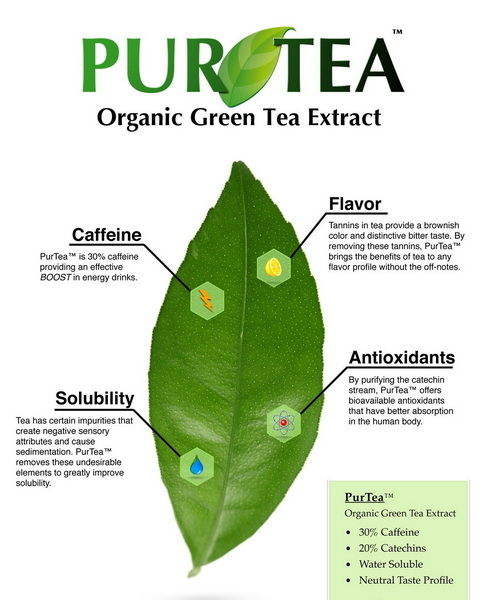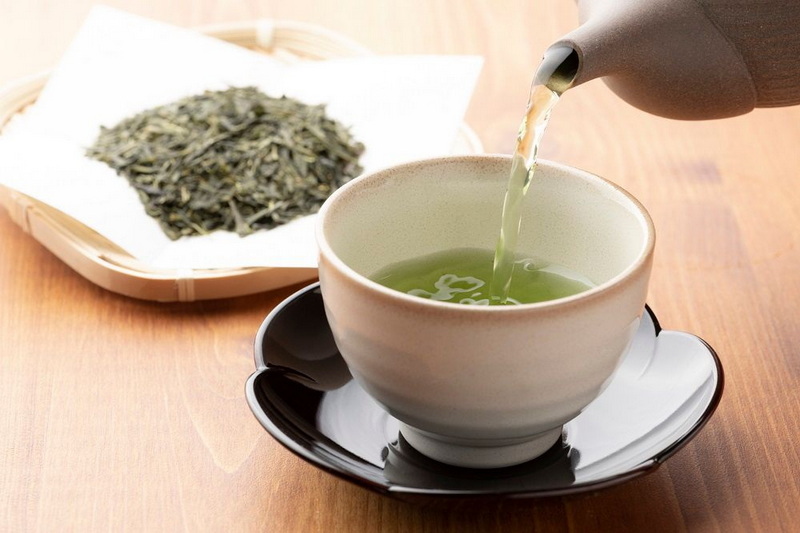Content Menu
● Understanding Caffeine in Green Tea Extract
● Health Benefits of Green Tea Extract
● How Caffeine Affects the Body
● Comparing Caffeine in Green Tea vs. Coffee
● Recommended Dosage for Green Tea Extract
● Safety Considerations
● Conclusion
● FAQ
>> 1. How much caffeine is typically found in a cup of brewed green tea?
>> 2. Can I find decaffeinated versions of green tea extract?
>> 3. What are the main health benefits associated with green tea extract?
>> 4. Is it safe to consume multiple servings of green tea extract?
>> 5. How should I choose a green tea extract supplement?
● Citations:
Green tea extract is derived from the leaves of the *Camellia sinensis* plant and is known for its numerous health benefits, largely attributed to its high concentration of antioxidants, particularly catechins. However, a common question arises regarding whether green tea extract contains caffeine, and if so, how much. This article will explore the caffeine content in green tea extract, its effects, and other related topics.

Understanding Caffeine in Green Tea Extract
Caffeine is a natural stimulant that affects the central nervous system, providing a temporary boost in energy and alertness. The caffeine content in green tea extract can vary significantly depending on the brand and formulation.
- Typical Caffeine Content: A standard brewed cup of green tea contains approximately 30-50 mg of caffeine. In contrast, green tea extract supplements can contain anywhere from 15 mg to over 200 mg of caffeine per serving, depending on the concentration of the extract and the manufacturer.
- Variability Among Brands: Different brands offer varying levels of caffeine in their green tea extracts. For instance:
- NOW Foods: 32 mg per capsule (400 mg of green tea extract)
- Nature's Truth: 200 mg of caffeine with 20 mg of green tea extract
- Life Extension: 25 mg of caffeine with 725 mg of green tea extract.
This variability means that consumers need to read labels carefully to understand how much caffeine they are consuming.
Health Benefits of Green Tea Extract
Green tea extract is celebrated not only for its caffeine content but also for its health-promoting properties:
- Antioxidant Properties: The primary antioxidants in green tea are catechins, particularly epigallocatechin gallate (EGCG), which have been shown to protect cells from oxidative stress and reduce inflammation. Studies indicate that these antioxidants can help lower the risk of chronic diseases by combating free radicals in the body.
- Weight Management: Some studies suggest that the combination of caffeine and catechins may enhance fat oxidation and improve metabolic rates, making it a popular choice for weight loss supplements. A meta-analysis found that green tea extract can help reduce body weight and body fat percentage when combined with a proper diet and exercise regimen.
- Cognitive Function: Caffeine in green tea extract may help improve mood and cognitive performance. It works synergistically with L-theanine, another compound found in green tea that promotes relaxation without drowsiness. This combination can lead to improved attention and focus while reducing anxiety levels.
- Cardiovascular Health: Regular consumption of green tea has been linked to lower cholesterol levels and improved heart health. The polyphenols in green tea may help reduce LDL cholesterol while increasing HDL cholesterol, thus lowering the risk of heart disease.
How Caffeine Affects the Body
Caffeine's effects can be both beneficial and adverse:
- Positive Effects:
- Increased alertness and energy levels.
- Enhanced athletic performance due to improved endurance.
- Potential neuroprotective effects against diseases like Alzheimer's and Parkinson's when consumed in moderation.
- Negative Effects:
- Overconsumption can lead to anxiety, insomnia, digestive issues, and increased heart rate.
- Individuals sensitive to caffeine might experience jitteriness or restlessness even at lower doses.

Comparing Caffeine in Green Tea vs. Coffee
While both beverages contain caffeine, their effects on the body can differ significantly due to their unique compositions:
| Beverage | Average Caffeine Content (per 8 oz) | Additional Compounds |
| Green Tea | 30-50 mg | L-theanine (promotes calmness) |
| Coffee | 95-200 mg | None |
Green tea tends to provide a more stable release of energy due to the presence of L-theanine, which helps mitigate some of the jittery side effects often associated with coffee consumption[4][13].
Recommended Dosage for Green Tea Extract
The recommended dosage for green tea extract varies based on individual health goals:
- For general health benefits: 250–500 mg per day
- For weight management: 400–800 mg per day, but it's essential to monitor for potential side effects.
It's crucial to consult with a healthcare professional before starting any new supplement regimen, especially if you have underlying health conditions or are taking medications.
Safety Considerations
While moderate consumption is generally safe for most people, excessive intake may lead to negative side effects such as liver damage or gastrointestinal issues. High doses (over 800 mg EGCG) have been linked to hepatotoxicity in some cases[9][14].
Conclusion
In summary, green tea extract does contain caffeine, with amounts varying significantly across different products. While it offers numerous health benefits—including antioxidant properties and potential weight management support—consumers should be aware of their total daily caffeine intake to avoid adverse effects. Moderation is key when incorporating green tea extract into your diet.

FAQ
1. How much caffeine is typically found in a cup of brewed green tea?
A standard cup of brewed green tea contains approximately 30-50 mg of caffeine.
2. Can I find decaffeinated versions of green tea extract?
Yes, some brands offer decaffeinated green tea extracts that contain minimal to no caffeine.
3. What are the main health benefits associated with green tea extract?
The main benefits include antioxidant protection, potential weight loss support, improved cognitive function, and cardiovascular health.
4. Is it safe to consume multiple servings of green tea extract?
While moderate consumption is generally safe for most people, excessive intake may lead to negative side effects such as liver damage or gastrointestinal issues.
5. How should I choose a green tea extract supplement?
Look for products that specify their caffeine content and are standardized for catechins. It's also advisable to consult with a healthcare professional before starting any new supplement regimen.
Citations:
[1] https://www.drugs.com/npp/green-tea.html
[2] https://www.healthline.com/nutrition/10-benefits-of-green-tea-extract
[3] https://pubmed.ncbi.nlm.nih.gov/38031409/
[4] https://www.truecitrus.com/blogs/tc/clean-caffeine-in-green-tea-vs-coffee
[5] https://www.ncbi.nlm.nih.gov/books/NBK547925/
[6] https://www.livestrong.com/article/186702-how-much-caffeine-is-in-green-tea-extract/
[7] https://pmc.ncbi.nlm.nih.gov/articles/PMC2855614/
[8] https://emerginginvestigators.org/articles/variation-in-caffeine-concentration-among-different-weight-loss-supplements-containing-green-tea-and-green-coffee-extracts/pdf
[9] https://www.canada.ca/en/health-canada/services/food-nutrition/public-involvement-partnerships/notice-modification-list-permitted-supplemental-ingredients-permit-use-green-tea-extract-supplemental-ingredient-foods/document.html
[10] https://www.mountsinai.org/health-library/herb/green-tea
[11] https://examine.com/supplements/green-tea-extract/
[12] https://hammernutrition.com/blogs/endurance-news-weekly/green-tea-extract-in-fully-charged
[13] https://www.healthline.com/nutrition/caffeine-in-tea-vs-coffee
[14] https://www.webmd.com/vitamins/ai/ingredientmono-960/green-tea
[15] https://www.elo.health/articles/green-tea-extract-supplements/
[16] https://www.healthline.com/nutrition/green-tea-vs-coffee
[17] https://www.healthline.com/nutrition/egcg-epigallocatechin-gallate
[18] https://health.clevelandclinic.org/green-tea-extract-a-better-way-to-boost-energy-or-not
[19] https://www.reddit.com/r/tea/comments/jmnf9a/can_anyone_clarify_the_difference_between/
[20] https://www.urmc.rochester.edu/encyclopedia/content?contenttypeid=19&contentid=greenteaextract
[21] https://www.sugimotousa.com/asset/5f662e0d05466?sa=X&ved=2ahUKEwisx4K36OyKAxUrUUEAHWa_FiwQ_B16BAgOEAI
[22] https://efsa.onlinelibrary.wiley.com/doi/10.2903/j.efsa.2018.5239
[23] https://www.medicalnewstoday.com/articles/269538
[24] https://www.womenshealthmag.com/food/a19924479/coffee-vs-green-tea/






























